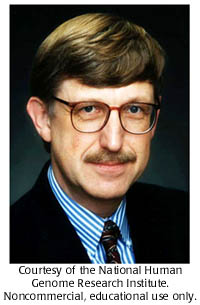Concept 39 A genome is an entire set of genes.

 Craig Venter and Francis Collins represent the commercial and the federally-funded efforts of the Human Genome Project.
Craig Venter and Francis Collins represent the commercial and the federally-funded efforts of the Human Genome Project.
- Go to:
- John Craig Venter (1946-)
Francis Collins (1950-)

If sequencing the human genome is the Holy Grail of biology, then Francis Collins is its King Arthur. Collins has overseen the mapping, the sequencing, and the funding of biology's first "big science" project as the Director of the National Human Genome Research Institutefrom 1993 to 2008.
For someone so intimately connected with the hottest topic in biology, Francis Collins oddly had no interest in biology as he grew up on a farm in the Shenandoah Valley of Virginia. Both parents were involved in the arts - his father was a drama professor at Mary Baldwin College - and produced plays on the stage they built on the farm.
Collins's mind was elsewhere and frequently filled with numbers as he contemplated the infinite outcomes of dividing by zero. In high school, his mathematical interests turned to chemistry, but biology held no appeal. "There didn't seem to be any logic to it - all we did was dissect things and memorize body parts," he said in an interview with Arts and Sciences Magazine.
Collins entered the University of Virginia as an Echols Scholar after graduating from high school at 16. He played the guitar too much in the first year, but afterward became "one of those science nerds you would not enjoy being in class with." In 1970, he left Virginia with a degree in chemistry, and headed to Yale for graduate school.
There, Collins finally learned that biology could be logical when he was "blown away" by a course in molecular biology. Combined with a drive to do something more obviously meaningful than theoretical physics, Collins went to medical school at UNC-Chapel Hill after completing his doctorate, then returned to Yale for a post-doc in human genetics.
At Yale, Collins began working on ways to search the genome for genes that cause human disease. He continued this work, which he dubbed "positional cloning," after moving to the University of Michigan as a professor in 1984. Five years later, Collins had his first big success with the method when he pinpointed the gene that causes cystic fibrosis.
He continued to search for disease genes at NIH, and pasted a new sticker onto the back of his motorcycle helmet every time he found one, until being appointed Director in 2009. He was awarded the U.S. Presidential Medial of Freedom in 2007 and the National Medal of Science in 2008.


A Time/CNN poll taken in June 2000 found 41% of Americans agreed with the statement that "developing technology to map the genome is morally wrong."

Do you think most people know what mapping is? Why would so many believe it's morally wrong?
 DNA is packaged in a chromosome.
DNA is packaged in a chromosome. Higher cells incorporate an ancient chromosome.
Higher cells incorporate an ancient chromosome. Some DNA does not encode protein.
Some DNA does not encode protein. Some DNA can jump.
Some DNA can jump. Genes can be turned on and off.
Genes can be turned on and off. Genes can be moved between species.
Genes can be moved between species. DNA responds to signals from outside the cell.
DNA responds to signals from outside the cell. Different genes are active in different kinds of cells.
Different genes are active in different kinds of cells. Master genes control basic body plans.
Master genes control basic body plans. Development balances cell growth and death.
Development balances cell growth and death. A genome is an entire set of genes.
A genome is an entire set of genes. Living things share common genes.
Living things share common genes. DNA is only the beginning for understanding the human genome.
DNA is only the beginning for understanding the human genome.